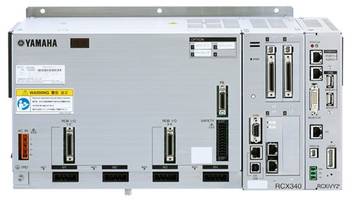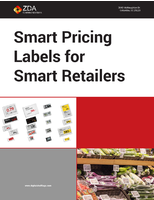New RCXiVY2+ Vision System Comes with Improved Search Speed and High-Performance Camera
Press Release Summary:

- Features blob detection that enables picking, presence recognition, and high-speed counting of multiple workpieces for irregular shaped objects such as foodstuffs and clothing
- Offers monitoring of detection status while robots are running in automatic mode
- Ideal for detection of irregular shaped objects, which are characteristic of industries such as foodstuffs, pharmaceuticals, clothing, and cosmetics
Original Press Release:
Yamaha Motor Launches New RCXiVY2+ Vision System — Capable of Detecting Irregular Shaped Objects; also Applicable to Food, Pharmaceuticals, Cosmetics, and Clothing —
IWATA, May 14, 2020—Yamaha Motor Co., Ltd. (Tokyo: 7272) announced today that it will launch the RCXiVY2+ vision system, which features a new “blob detection” enabling picking, presence recognition, and high-speed counting of multiple workpieces for irregular shaped objects such as foodstuffs and clothing, on June 1. As the successor to the existing iVY2, in addition to new functionality this new model features a high-performance camera and improved processing capability, enabling up to 45% detection time reduction compared to the current model.
A feature of Yamaha Motor’s vision system is its integration with robots by incorporating a vision board, lighting board, and tracking board in the RCX3 series multi-axis robot controller. This advanced integration enables unitary management of robot control, image processing, lighting control, and conveyor tracking data processing with only the robot program, significantly reducing equipment setup time. The further addition of “blob detection” functionality means that the system can now handle products such as foodstuffs and clothing - which tend to have greater variation in shape and size compared to industrial products - expanding its possible range of applications.
Model: RCXiVY2+
Launch Date: June 1, 2020
Target Sales: 340 Units (Series Total/Annual)
Market Background
The industrial robot market continues to grow due to the declining labor force and rising wages driving requirements for increased factory automation. In addition to the automotive, electrical, and electronics industries, in recent years the utilization of industrial robots has also been increasing in industries such as foodstuffs, clothing, and cosmetics. In response, Yamaha Motor has developed vision systems optimized for detection of irregular shaped objects, which are characteristic of industries such as foodstuffs, pharmaceuticals, clothing, and cosmetics.
New Functions of the RCXiVY2+
- Blob detection which excels in recognizing irregular shaped objects
The word “blob” evokes the image of an amorphous lump or mass. Blob detection functions take greyscale images (including variations in light and shade) captured by cameras, and apply certain threshold value criteria, converting them to black and white gradations through binary coded processing. This detection method can then recognize the presence/absence, number, size, etc. of blobs.
The RCXiVY2+’s blob detection can recognize workpieces between two and ten times faster than in the edge detection functions of previous models. This upgrade means that the new model can handle tasks such as picking, presence recognition, and high-speed counting of multiple workpieces of irregular shaped objects such as foodstuffs and clothing. The combination of the RCXiVY2+ and SCARA robots is ideal for high-speed conveyor tracking.
- Performance improvement
The search speed has been improved by 8 to 45% because of the improvement of CPU. In addition, the adoption of a highperformance camera has improved the number of pixels and frame rate.
Other Features:
- Simple auto-calibration function
High-precision camera calibration can be completed simply by following the easy-to-use wizard.
- Simple workpiece registration function
Workpiece registration takes just three steps - image capture, contour setting, and detection position registration.
- Integrated control of the vision program using only the robot program
There is no need to create a coordinate conversion program thanks to unified management from the robot program.
- Also handles moving cameras
Coordinates can be automatically converted to suit a robot's movements when a camera is installed on the robot.
- Wide range of product registration is possible
254 product types can be registered for use in detection, meaning that changeover work can be carried out simply by changing the product number.
- Monitoring of detection status while robots are running in automatic mode
With the RCXiVY2+ Studio and an external monitor, monitoring of detection status while robots are running in automatic mode as well as reference mark detection status during calibration setting are possible.
Specifications:
Basic Specifications
Compatible controllers: RCX340/RCX320
No. of pixels:
728(H) x 544(V) (400,000 pixels)
1,456(H) x 1,088(V) (1.6 megapixels)
2,048(H) x 1,536(V) (3.2 megapixels)
2,592(H) x 1,944(V) (5 megapixels)
Number of set product types: 254 product types
No. of connected cameras: Max. 2
Camera connections: GigE camera PoE: Up to IEEE802.3af 1ch 7W
External interface: Ethernet (1000BASE-T) *Used for settings and monitor
External monitor output: DVI-I *Analog monitors can also be used via a conversion adaptor Monitor resolution: 1024x768 Vertical period frequency: 60Hz Horizontal period frequency: 48.4kHz
Power supply: DC 24V ±10 % 1.5 A Max
Exterior dimensions: W45mm x H195mm x D130mm (RCXiVY2+ unit only)
Weight: 0.8Kg (RCXiVY2+ unit only, when lighting control option is selected)
Detection method: Edge detection (Correlative edge filter, Sobel filter) Measurement function, blob detection
Image capture:
Trigger mode: Software trigger, hardware trigger
External trigger inputs: 2
Functions: Position detection, coordinate conversion, automatic point data creation, distortion and tilt correction
Camera installation positions: Set to either fixed cameras (above and below) or robots (Y, Z axes) Vertical direction with regard to workpieces being photographed is recommended
Included assistance functions: Calibration, image saving function, product type registration, reference mark registration, measurement function registration, blob registration, monitor function
Lighting control option:
No. of connected lighting units: Max. 2
Light modulation method: PWM modulation control (0-100%)PWM frequency 62.5kHz/125kHz switchable Continuous light, strobe light (tracks camera exposure)
Lighting power input: DC 12V or DC 24V (2ch common, external supply)
Lighting output:
For DC 12V supply: 2ch, total less than 40W
For DC 24V supply: 2ch, total less than 80W




